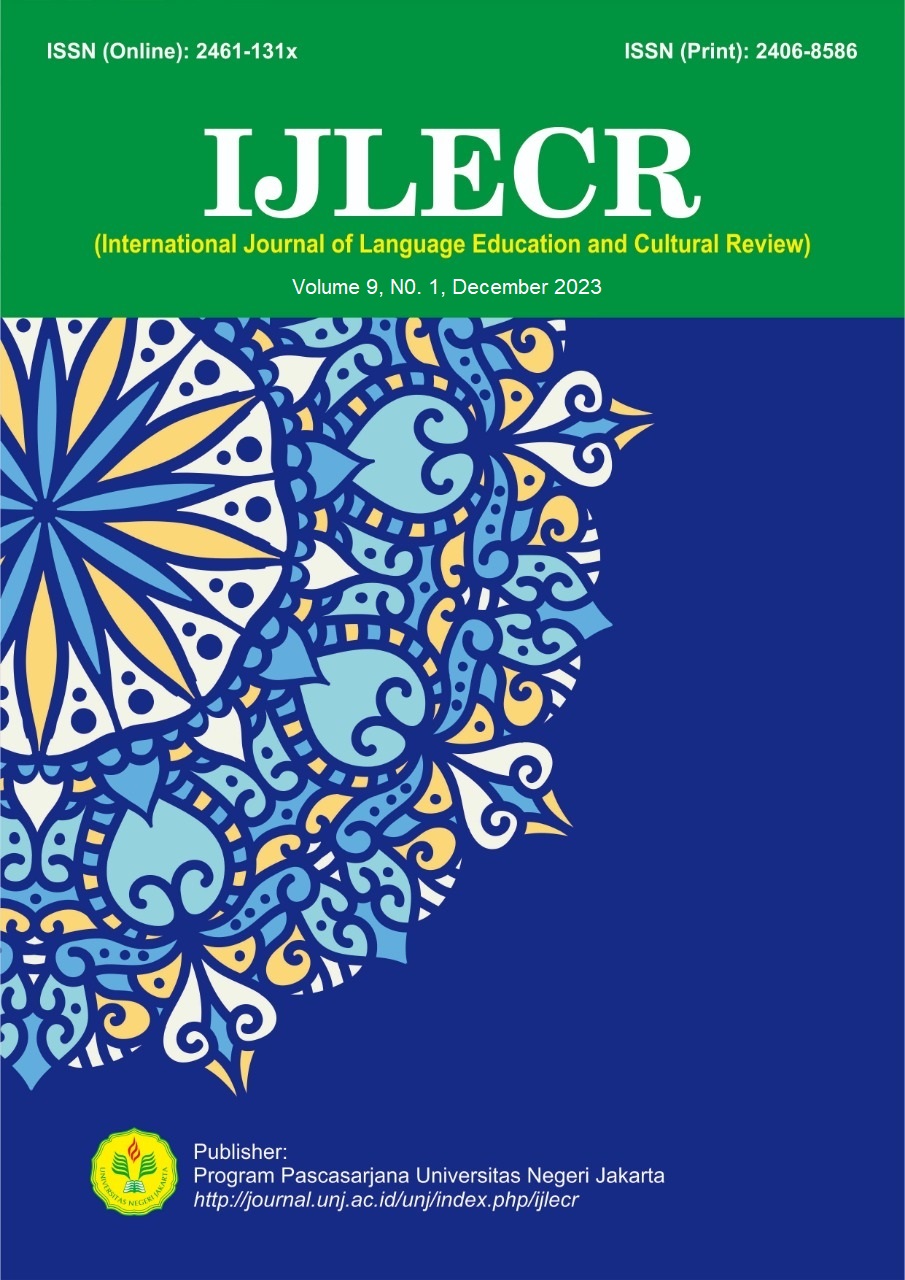The Effect of the Problem-Based Learning Model on Students Critical Thinking Ability
DOI:
https://doi.org/10.21009/ijlecr.v9i1.37837Kata Kunci:
Problem-Based Learning Model, Students' Critical Thinking AbilityAbstrak
Students' critical thinking skills are still a problem that lecturers in Indonesia still need to overcome. One way to improve student's critical thinking skills is by giving action in class, namely the problem-based learning model. For this reason, this study aimed to determine the effect of problem-based learning models on students' critical thinking skills. This research method uses a quantitative approach. The research design uses quasi-experimental research using two classes as samples with different treatments. The instruments in this study used observation guidelines and tests in the form of descriptive questions to measure students' critical thinking skills. The data that has been obtained is in the form of data from pretest and posttest values. Data were analyzed using SPSS 16.0 to see the normality and homogeneity tests as a condition for conducting the t-test. The results obtained from the normality test with a sig level of 0.200> 0.05 mean that the data is normally distributed. Then a homogeneity test was carried out, and the results showed 0.365> 0.05, which indicated that the sample data was homogeneous or uniform. After the two test conditions are met, then the t-test is performed. The results of the t-test obtained sig. 0.00 <0.05 indicates an influence of the problem-based learning model on the critical thinking skills of students of the Indonesian Language and Literature Education Study Program, Universitas PGRI Yogyakarta.
Referensi
Akınoğlu, O., & Tandoğan, R. O.. (2007). The effects of problem based active learning in science education on student’ academic achievement, attitude and concept learning. Eurasia Journal of Mathematics, Science & Technology Education, 3(1). https://doi.org/10.12973/ejmste/75375
Arends, R. (2012). Learning to teach (9th edition). New York: McGraw-Hil.
Astleitner, H. (2002). Theaching critical thinking. Journal of Instructional Psychology, 29(2). 29(2), 53-76. https://www.learntechlib.org/p/95442/
Birgili, B. (2015). Creative and critical thinking skills in problem-based learning environments. Journal of Gifted Education and Creativity, 2(2), 71-80. https://dergipark.org.tr/en/pub/jgedc/issue/38680/449365
Duch, B. J., Groh, S. E, & Allen, D. E. (Eds.). (2001). The power of problem-based learning. Sterling, VA: Stylus.
Ennis, R. H. (1993). Critical thinking assessment. Theory into Practice, 32, 179-186. https://doi.org/10.1080/00405849309543594
Hairuddin, N. (2018). The use of problem based learning (pbl) method in teaching English writing at SMAN 5 Makassar. Seltics Journal: Scope of English Language Teaching, Literature and Linguistics Journal, 1(1), 1-9. https://ejournals.umma.ac.id/index.php/seltics/article/view/75
Hale, S. (2008). Acritical analysis of Richard Paul’s substantive tran-disiplinary conception of critical thinking. Union University of Cicinnati: Ohio.
Hitchcock, D. (2022). Critical thinking: The Stanford encyclopedia of philosophy. https://plato.stanford.edu/archives/win2022/entries/critical-thinking/
Koroh, T.R. & Ly, P. (2020). Pengaruh model pembelajaran problem based learning dalam pembelajaran pendidikan kewarganegaraan terhadap kemampuan berpikir kritis mahasiswa. Jurnal: Jurnal Kependidikan, 6(1) http://ojs.ikipmataram.ac.id/index.php/jurnalkependidikan/index
Kurniahtunnisa, K., Dewi, N. K., Utami, N.R. (2016). Pengaruh pembelajaran problem based learning terhadap kemampuan berpikir kritis siswa materi sistem ekresi. Journal of Biology Education, 5(3). 310-318. https://journal.unnes.ac.id/sju/index.php/ujbe/article/view/14865
Li, L. W. (2011). Design of professional english writing evaluation model critical thinking ability cultivation oriented. Foreign Languages and Their Teaching.
Liu, Y., & Pásztor, A. (2022). Effects of problem-based learning instructional intervention on critical thinking in higher education: A meta-analysis. Thinking Skills and Creativity, 45, 101069. https://doi.org/10.1016/j.tsc.2022.101069
Masek, A., & Yamin, S. (2011). The effect of problem based learning on critical thinking ability: A theoretical and empirical review. International Review of Social Sciences and Humanities, 2(1), 215-221.
Miterianifa, dkk. (2019). Meta-analysis: The effect of problem-based learning on students’ critical thinking skills. The 2nd International Conference on Science, Mathematics, Environment, and Education. https://doi.org/10.1063/1.5139796
Mufit, F., Festiyed, Fauzan, A., & Lufri. (2019). The Application of Real Experiments Video Analysis in the CCBL Model to Remediate the Misconceptions About Motion’s Concept. Jurnal: Physiscs: Conference Series, 1317(1).
Mulyasa, E. (2014). Implementasi kurikulum 2013. Bandung: PT Remaja Rosdakarya.
Nelson, E. T. (2008). Effects of online problem based learning on teachers technology integration perceptions and planning. Retrieved from Pro Quest Digital Dissertations.
Norfar, T. & Fancher, C. (2022). Project-based learning in the math classroom. England: Routledge.
Nuryanti, L., dkk. (2018). Analisis kemampuan berpikir kritis siswa smp. Jurnal: Jurnal Pendidikan. 3(2). http://journal.um.ac.id/index.php/jptpp/article/view/10490
Özkan, I. (2010). A path to critical thinking. Procedia - Social and Behavioral Sciences, 3(1), 210-212. https://doi.org/10.1016/j.sbspro.2010.07.034
Rusman. (2014). Model-model pembelajaran. Jakarta: PT RajaGrafindo Persada.
Seibert, S. A. (2021). Problem-based learning: A strategy to foster generation Z's critical thinking and perseverance. Teaching and Learning in Nursing, 16(1), 85-88. https://www.sciencedirect.com/science/article/pii/S1557308720301049
Song, J., & Cheng, L. (2015). The PBL flipping model research of the college English teaching under the MOOC platform. Learning and Practice, 5, 135-140.
Sumitro, A. H., Setyosari, P., & Sumarmi. (2017). Penerapan model problem based learning meningkatkan motivasi dan hasil belajar ips. Jurnal Pendidikan: Teori, Penelitian, dan Pengembangan, 12(1). https://doi.org/http://dx.doi.org/10.17977/jptpp.v2i9.9936
Tan, O.S. (2009). Problem-based learning and creativity. Singapura: Cengange Learning. Asia Pte Ltd.
Ulger, K. (2018). The effect of problem-based learning on the creative thinking and critical thinking disposition of students in visual arts education. Interdisciplinary Journal of Problem-Based Learning, 12(1). https://docs.lib.purdue.edu/ijpbl/vol12/iss1/10/








